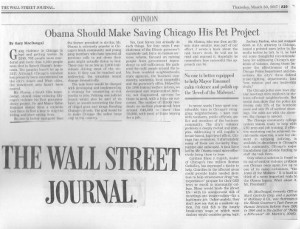The Wall Street Journal
March 30, 2017
By GARY E. MACDOUGAL

Gang violence in Chicago is bad and getting worse. In 2016, 762 people were murdered
and more than 4,300 people were shot in Barack Obama’s hometown. The gunplay hasn’t
let up in 2017. Although Chicago’s violence has primarily been concentrated on the city’s
South and West sides, the downtown area hasn’t been spared.
Mr. Obama, a South Side homeowner, should make reducing Chicago’s violence his first
postpresidency project. He and Mayor Rahm Emanuel should form a citywide task force
to find a way to stop the killing and start saving lives.
No one is better equipped than the former president to do this. Mr. Obama is extremely
popular in Chicago’s black community and young gang members who have ignored all
previous calls to put down their guns might actually listen to him. There may be as few
as 2,000 individuals driving most of the violence. If they can be reached and redirected,
the situation would change dramatically.
The task force would be charged with developing and implementing a strategy for
connecting at-risk youths to jobs. Policing and judicial issues would also be part of its
brief, as would restricting the flow of illegal guns and drugs flooding Chicago’s streets.
The goal would be to make Chicago the safest large city in the country.
Yes, task forces can actually do such things. For four years I was chairman of the Illinois
governor’s statewide task force on human-services reform, focused on moving people
from government dependency to self-sufficiency. We gathered the right people around
the table from troubled neighborhoods, state agencies, the business community,
academia, local nonprofits and the governor’s office. Helped by the 1996 federal welfare
reform, we developed and implemented holistic, not fragmented, services for those in
need, with a focus on outcomes. The number of Illinois residents on welfare plummeted
from around 640,000 to fewer than 50,000, with most of those leaving for a job.
Mr. Obama, who was then an Illinois state senator, was part of our effort. I wrote a book
about the task force’s work. He told me he read and enjoyed it. Hopefully he remembers
how successful this approach can be.
In recent weeks I have spent considerable time in Chicago’s struggling neighborhoods. I
have met with residents, public officials, police and members of the business
community. The city’s violence problem is deeply rooted and complex. Addressing it will
require a broad-based, high-level effort. Chicago has resources. Unfortunately many of
them are currently fragmented and unfocused. A task force led by Mr. Obama could
more effectively bring them to bear.
Cardinal Blase J. Cupich, leader of Chicago’s two million Roman Catholics, has
expressed a desire to help. Churches in the affected areas could provide badly needed
mentors to help streetcorner drug “entrepreneurs” prepare for their GED tests or enroll
in community college. Many would trade the street life—with its omnipresent risk of
shootings and incarceration—for a legitimate job. Unfortunately, they don’t now see
that as a realistic option. I’m told $15 is the hourly break-even wage at which most
dealers would consider going legit.
Zachary Fardon, who just stepped down as U.S. attorney in Chicago, issued a pointed
open letter to the media before he left. In it, he laid out some thoughtful
recommendations for addressing Chicago’s epidemic of violence. Among them: Improve
the effectiveness of the Chicago Police Department and consolidate the city’s three
federal crime-fighting departments into “one mission and one leadership chain.”
The Chicago police now have regular meetings with residents in violence-affected
neighborhoods. But recent data show that the police are closing only 21% of the
homicide cases and only 3% of nonfatal shootings. The odds are with the shooters. Big
change is needed.
The Chicago community college system stands ready to help with GED prep and job
training, if effective mentoring can be achieved. Social-media expertise, a new key
element in antigang policing, is available in abundance in Chicago’s tech community.
Chicago’s major foundations can provide funding to staff the task force.
Only when a solution is found to its out-of-control violence problem can Chicago once
again live up to one of its many nicknames, “the Jewel of the Midwest.” It is hard to
think of a more important coda to the Obama legacy. What about it, Mr. President?
Mr. MacDougal, formerly CEO of Mark Controls Corp. and a partner of McKinsey & Co.,
was chairman of the Illinois Governor’s Task Force on Human Services Reform from 1993
to 1996 and is the author of “Make a Difference” (St. Martin’s, 2005).
Appeared in the Mar. 30, 2017, print edition.